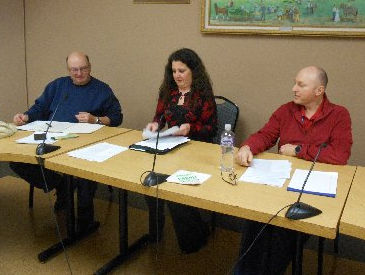Amy Smagula, limnologist and Exotic Species Program Coordinator at the NH Department of Environmental Services (NHDES), addressed the PLIA Board of Directors at its November 15, 2016 meeting. She spoke about Pawtuckaway Lake’s variable milfoil infestation, offering information and outlining recommendations for its management in the near future.
 Her plan of action included prevention, early detection, rapid response, and control efforts. Amy spoke encouragingly about the fact that the infestation in Pawtuckaway Lake has been neither dense nor widespread so far, and advised the PLIA that its current campaign of containment and removal is a winning strategy that should be continued.
Her plan of action included prevention, early detection, rapid response, and control efforts. Amy spoke encouragingly about the fact that the infestation in Pawtuckaway Lake has been neither dense nor widespread so far, and advised the PLIA that its current campaign of containment and removal is a winning strategy that should be continued.
Amy cautioned, however, that variable milfoil is a formidable pest. Even though no growth was apparent upon recent inspection of the lake by our Weed Watchers and NHDES biologists, it can lurk undetected to re-emerge in the early spring. Milfoil can grow an inch a day in optimal conditions. Further, it is capable of growing under the ice and is undisturbed by exposure to freezing temperatures and snow or frost.
Herbicide treatment is not recommended, as it must bond to actively growing plants to work and is only effective for about a 48 hour period. For that reason, it is not a plan for prevention. Due to the nature, location, and size of our infestation, Amy specifically said that herbicide treatment is definitely off the table.
Biweekly surveying of the lake by our Weed Watchers is recommended. Amy affirmed that the team who regularly patrolled the South Channel locating and marking milfoil growths this past season is crucial to the rapid response that NHDES certified divers have been able to provide. The coordination of these efforts has thus far made it possible to eliminate new growths not long after they have been detected.
Curtailing boat and fishing traffic through the sensitive area of milfoil infestations near the State Park boat launch will remain a challenge, she acknowledged. The real concern is that fragments broken off in the channel will be transported unknowingly to other parts of the lake where the weed may be harder to spot and will consequently spread. In addition, engaging State Park personnel in education and awareness efforts will be a key component to our management plan. She emphasized that our Lake Host Program must remain vigorous.
The Board expressed its appreciation to Amy for sharing her expertise and helping the PLIA address this situation in the most comprehensive and effective manner. NHDES has been and continues to be our strongest ally in our fight to eliminate variable milfoil, offering its resources and assistance on a continuous basis.
In the coming 2017 season, the PLIA will be calling for assistance from its membership to join these efforts. Please consider becoming a member, renewing a membership, or offering your time as a volunteer. Further, we are looking for folks with PADI SCUBA diving credentials who are willing to take the State weed-control-diver-program training to help us with future eradication efforts. For information, please contact PLIA Vice-President Tom Duffy at 603 303-3039, tom.duffy@verani.com . Together we can win this battle!